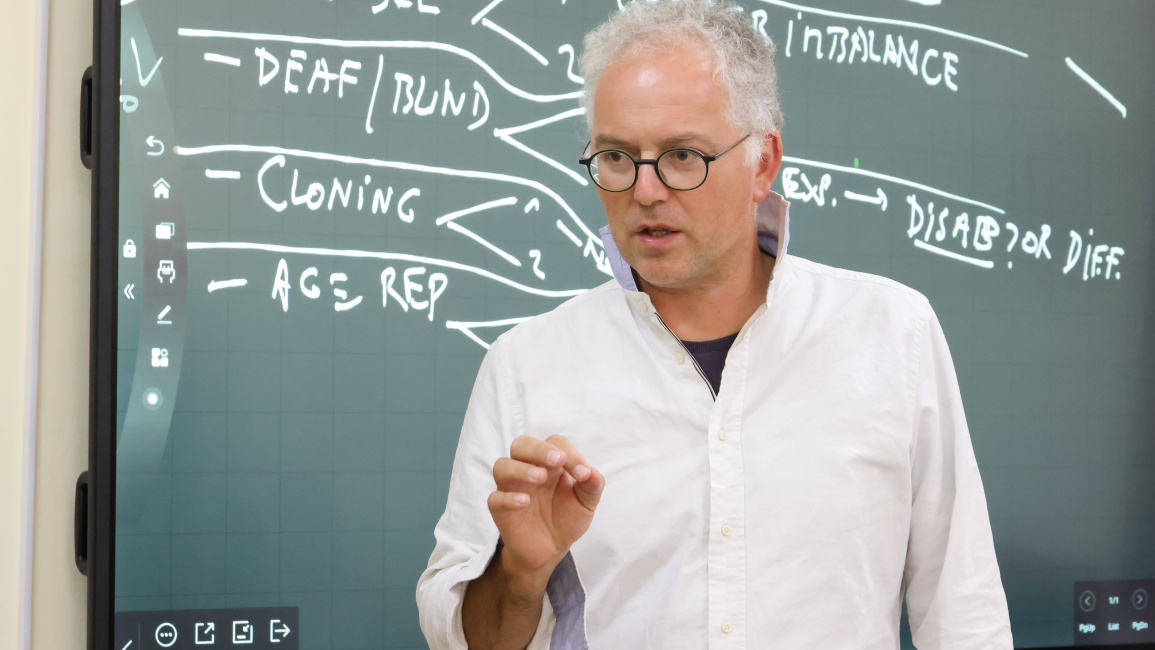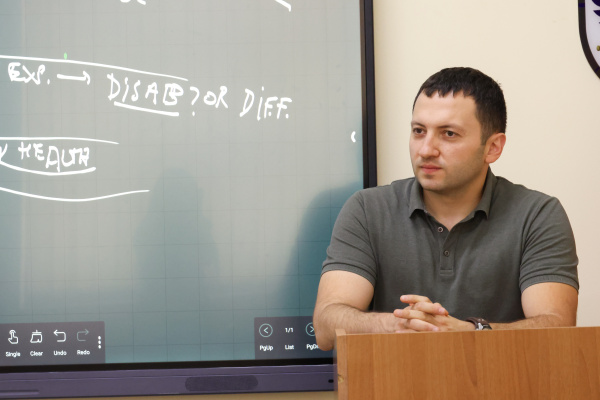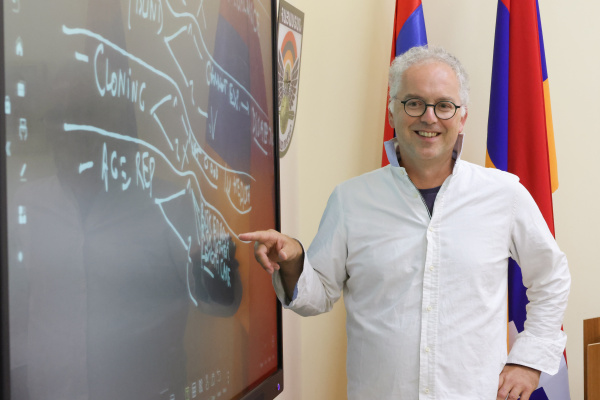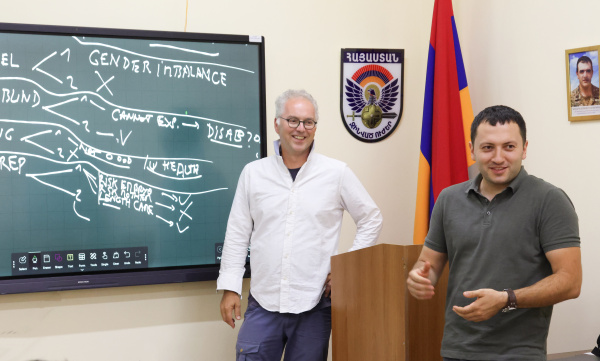October 03, 2024 | 15:55
Education
International cooperation
Enhancing collaboration with UCLouvain through effective joint programs
Yerevan State University and the UCLouvain collaborate under the Erasmus+ Teaching Mobility Programme. Both institutions have engaged in various initiatives, including reciprocal visits and lectures, which have strengthened their academic ties. The fourth joint program has recently launched at the YSU Faculty of Philosophy and Psychology.

The program is led by Levon Babajanyan, Associate Professor at the YSU Chair of Social Philosophy, Ethics and Aesthetics, alongside Professor Axel Gosseries, Director of the Institute of Philosophy at the UCLouvain. Together, they delivered a series of lectures titled "Bioethical Issues in Healthcare," aimed at introducing students to modern bioethical challenges in the healthcare sector.
The collaboration between Levon Babajanyan and Axel Gosseries dates back to 2014, when Axel Gosseries visited Armenia to deliver a lecture on philosophy. At that time, L. Babajanyan was still a PhD student. Through these lectures, they developed a closer relationship, discovered shared interests, and set the stage for new collaborations.
What is Bioethics?

Levon Babajanyan has been teaching the subject of "Bioethics" for six years. In the interview with us, he explained that bioethics is a subject of moral philosophy, which can be divided into three categories: metaethics, normative ethics, and applied ethics.
Metaethics explores questions regarding the nature of moral norms, such as whether moral norms can have truth value, if there are moral facts, and whether they are recognizable. Normative ethics focuses on defining, formulating, and adjusting moral norms, addressing questions like what constitutes justice, freedom, and duty. Applied ethics seeks to resolve moral dilemmas and real-life problems by applying moral theories.
Bioethics is a branch of applied ethics that focuses on discussing and resolving moral issues in healthcare, medicine, biology, and related fields. It addresses the ethical dilemmas associated with biological life and death in a broad sense, using moral knowledge, theories, and methods to find solutions.
Bioethics specialists seek to address both situational and principled issues in healthcare, medicine, and related fields by employing moral theories, methods, and tools from ethical studies.
"They offer solutions and approaches to these issues and discuss them from an ethical perspective. For instance, when considering euthanasia (the act of ending a life to relieve pain and suffering), we must ask whether it is morally acceptable. The same applies to issues like abortion, genetic enhancement, and vaccinations. What moral dilemmas, problems, and contradictions arise with their application, and how can these issues be addressed? What methodologies and principles should guide us? These are the types of problems that require significant moral preparation and experience to resolve," explained L. Babajanyan.
Challenges and Innovations of the Field at the Core of Lectures
Levon Babajanyan noted that discussions during the lectures revolved around various issues, such as gender-based abortion, vaccinations, age restrictions in the healthcare sector, and the distribution of limited health resources. However, the main emphasis of the lecture series was that the discussion of bioethical issues was conducted using a specifically defined methodology, which provided clarity, certainty, and practicality to the conversations. The course included numerous practical tasks, such as group work, oral presentations, written assignments, and problem-solving exercises.
"Initially, we presented theories and methodologies for discussing these issues, then divided the course into groups, assigning specific situations and topics for discussion. Students were highly engaged, sometimes making it challenging to manage their enthusiasm. These lectures are also crucial for intercultural communication. Students recognize that, despite cultural differences, there are many commonalities in values and worldviews among different societies, highlighting how strongly people from various parts of the world are connected by shared problems, concerns, and thoughts," emphasized L. Babajanyan.
The Intersection of Bioethics and Philosophy
Professor Axel Gosseries is a philosopher, more specifically, a political philosopher and ethicist-researcher, the author of many professional books. The professor emphasizes that political philosophy deals with two main theories: theories of democracy and justice. While he focuses primarily on the theory of justice, he also has works in the field of the theory of democracy. In that context, Gosseries particularly addresses issues related to intergenerational justice, which forms the core of much of his work.
This year, his co-authored book "Environmental Justice" will be published, and last year his work "Intergenerational Justice" was published by the esteemed publishing house Polity. Among researchers in intergenerational justice, Axel Gosseries is one of the most cited figures in the field. He teaches courses related to political philosophy and ethics at the UCLouvain, including "Advanced Political Philosophy", "Ethics and Information, Communication, Technology", "Normative Economics and Practical Ethics".
The professor stressed that bioethics is intrinsically connected to philosophy, as it addresses issues related to human life.

"We take a problem and try to solve it, and in doing so, we engage with individuals and their ideas about the definition of morality, which ties back to philosophical issues. For instance, in the first lesson, we discussed age-related limitations in healthcare, particularly the preference for administering vaccinations to adults. When healthcare services needed to be focused on already affected patients, young people were prioritized. This raised the question: what is the common moral principle underlying these seemingly different policies? Formulating this principle is a moral and philosophical challenge that serves as the foundation for developing and implementing policies," Gosseries explained. He added that to understand these approaches, one must grasp the philosophical and moral theories and the basis for these theories and decision-making.
In response to the question of whether bioethical issues in the healthcare sector differ across cultures, the researcher stated: "It is natural that different cultures encounter distinct and relevant problems. For example, one topic we discussed was egg freezing, a practice that is not widely accepted in Armenia. Despite this fact, it was interesting for students to discuss this issue because the moral questions related to this process are rooted in people's philosophical and worldview beliefs.
We also discussed the issue of using meat as food. Many people here are carnivores and see no ethical issues, but if we posed the same question to Canadian students, we might receive a different perspective, as many of them are vegetarians. We aim to tackle complex issues in a structured way; we ask students to clearly articulate their positions and then provide supporting arguments. This approach enables students to clearly define their moral stance for themselves and for others," explained Gosseries.
According to the specialist, the differences in students' approaches and responses to specific questions stem from their varying experiences and value systems. However, there are also many commonalities.
Experts taught students to recognize problems and identify techniques for solving them, highlighting both effective and ineffective ways of thinking. Axel Gosseries emphasized that a key condition for the successful implementation of the program is the disciplined presence and active participation of students; without this, similar programs for lecturers’ mobility would lose their value. He noted that through their collaboration with L. Babajanyan, they were able to ensure that students engaged fully in the course rather than participating only sporadically.
Future Perspectives on Ongoing Cooperation

The Belgian professor noted that the cooperation between the two universities will continue for another two years within the framework of the Erasmus+ Programme, but the parties intend to extend the program further, as its effectiveness is obvious.
"If it is relatively easy for Belgian professors to hold lectures in Armenia through similar programs, Armenian professors encounter specific challenges when participating. For instance, the classroom workload of local professors often restricts their scheduling flexibility, making it difficult to coordinate and complete class times. Additionally, financial constraints within the program need to be addressed. I hope these issues will be resolved, leading to an increase in the frequency of mutual visits as part of similar programs in the future," said Axel Gosseries.
Both Levon Babajanyan and Axel Gosseries emphasized that there is a strong desire on both sides to continue cooperation and implement new joint educational programs in the future.

